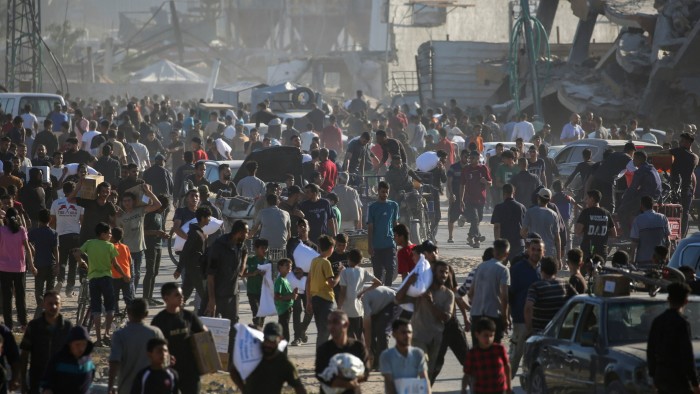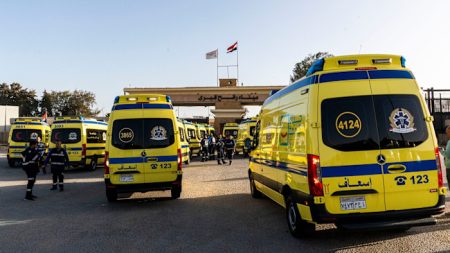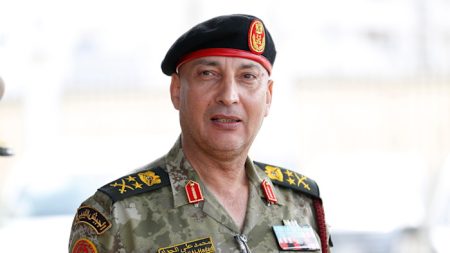Unlock the Editor’s Digest for free
Roula Khalaf, Editor of the FT, selects her favourite stories in this weekly newsletter.
A World Food Programme warehouse in central Gaza has been looted during a chaotic rush in which at least two people may have been killed, the UN’s humanitarian agency said.
Footage shared on social media, and confirmed by UN officials, showed hundreds of “hungry people . . . in search of food” inside a WFP warehouse on Wednesday, ripping up boxes the agency said “had been pre-positioned for distribution”.
The incident at Deir al-Balah marked the second day of civil disorder involving scarce food supplies in Gaza, after an Israeli siege that has lasted nearly three months brought the entire enclave to the edge of famine.
The WFP said several people had also been injured in Wednesday’s incident, while it was still investigating initial reports that two people had died during the chaos at its warehouse.
Israeli troops used live fire on Tuesday to control crowds of Palestinian families who nearly overwhelmed a food distribution site on its first day of operation.
The UN’s OHCHR human rights office said at least 47 people had been hurt on Tuesday trying to collect aid.
A Red Cross field hospital in southern Gaza received an influx of about 50 patients on the night of May 27, including women and children, all with gunshot wounds, the International Committee of the Red Cross said.
The ICRC added that it was “gravely concerned by the distressing events”.
“Gaza needs an immediate step-up of food assistance,” the WFP said after the latest looting incident, which it blamed on desperation caused by Israel’s siege. “This is the only way to reassure people they will not starve.”
Hunger is so widespread among Gaza’s 2.1mn people and food so scarce that humanitarian agencies are concerned the chaos may deepen, especially as the new Israel-backed Gaza Humanitarian Foundation stumbled in its first week of operations.
The GHF, championed by Israel and the US as a replacement to the decades old UN-run system of bringing humanitarian assistance into Gaza, said it had managed to open a second site in the south on Wednesday.
The organisation said it had distributed about 800,000 meals in total over its first two days.
The fledgling group has been boycotted by most humanitarian agencies with experience in Gaza because of its militarised model of food delivery. Its foreign mercenaries guard food convoys and distribution sites, backstopped by Israeli forces.
Several of GHF’s senior leaders have left this week, with at least one citing an inability to “adhere to humanitarian principles”.
Its location of food distribution sites in southern parts of the shattered enclave has also raised fears that Israel will use food to lure hungry Palestinians south, resulting in mass displacement.
“There are many parties who wish to see GHF fail,” the foundation said. “Their goal is to force a return to the status quo, even if it means risking life-saving aid to the people of Gaza.”
Under intense international pressure, Israel’s Prime Minister Benjamin Netanyahu allowed a small amount of aid from the UN-run system to start entering Gaza last week. So far, fewer than 900 trucks have been permitted entry over the past 10 days, compared with flows of 700 a day before Hamas’s attack on Israel on October 7 2023 that triggered the latest conflict.
“This is comparable to a lifeboat after the ship has sunk,” Sigrid Kaag, the UN’s special co-ordinator for the Middle East peace process, told the Security Council on Wednesday.
Israeli military operations have been so intense that humanitarian workers have only been able to drive about 200 of those trucks from the border checkpoints to warehouses for distribution, a UN official said.
The Israeli military’s Arabic-language spokesperson, Avichai Adraee, claimed without evidence that the footage showed Hamas had hidden food from Gazans, although the WFP confirmed the facility belonged to the agency.
Israel has moved to cut the UN out of the system of distributing humanitarian assistance in Gaza, partly over what it said were concerns about Hamas’s alleged theft of aid.
However, the UN and other agencies say they have never been presented with evidence that the militant group steals supplies in any orchestrated or widespread way.
Additional reporting by Heba Saleh in Cairo
Read the full article here













